Pharmacological, psychological and non-invasive brain stimulation interventions for preventing depression after stroke
- PMID: 32390167
- PMCID: PMC7211517
- DOI: 10.1002/14651858.CD003689.pub4
Pharmacological, psychological and non-invasive brain stimulation interventions for preventing depression after stroke
Abstract
Background: Depression is an important consequence of stroke that influences recovery yet often is not detected, or is inadequately treated. This is an update and expansion of a Cochrane Review first published in 2004 and previously updated in 2008.
Objectives: The primary objective is to test the hypothesis that pharmacological, psychological therapy, non-invasive brain stimulation, or combinations of these interventions reduce the incidence of diagnosable depression after stroke. Secondary objectives are to test the hypothesis that pharmacological, psychological therapy, non-invasive brain stimulation or combinations of these interventions reduce levels of depressive symptoms and dependency, and improve physical functioning after stroke. We also aim to determine the safety of, and adherence to, the interventions.
Search methods: We searched the Specialised Register of Cochrane Stroke and the Cochrane Depression Anxiety and Neurosis (last searched August 2018). In addition, we searched the following databases; Cochrane Central Register of Controlled Trials, CENTRAL (the Cochrane Library, 2018, Issue 8), MEDLINE (1966 to August 2018), Embase (1980 to August 2018), PsycINFO (1967 to August 2018), CINAHL (1982 to August 2018) and three Web of Science indexes (2002 to August 2018). We also searched reference lists, clinical trial registers (World Health Organization International Clinical Trials Registry Platform (WHO ICTRP); to August 2018 and ClinicalTrials.gov; to August 2018), conference proceedings; we also contacted study authors.
Selection criteria: Randomised controlled trials (RCTs) comparing: 1) pharmacological interventions with placebo; 2) one of various forms of psychological therapy with usual care and/or attention control; 3) one of various forms of non-invasive brain stimulation with sham stimulation or usual care; 4) a pharmacological intervention and one of various forms of psychological therapy with a pharmacological intervention and usual care and/or attention control; 5) non-invasive brain stimulation and pharmacological intervention with a pharmacological intervention and sham stimulation or usual care; 6) pharmacological intervention and one of various forms of psychological therapy with placebo and psychological therapy; 7) pharmacological intervention and non-invasive brain stimulation with placebo plus non-invasive brain stimulation; 8) non-invasive brain stimulation and one of various forms of psychological therapy versus non-invasive brain stimulation plus usual care and/or attention control; and 9) non-invasive brain stimulation and one of various forms of psychological therapy versus sham brain stimulation or usual care plus psychological therapy, with the intention of preventing depression after stroke.
Data collection and analysis: Review authors independently selected studies, assessed risk of bias, and extracted data from all included studies. We calculated mean difference (MD) or standardised mean difference (SMD) for continuous data and risk ratio (RR) for dichotomous data with 95% confidence intervals (CIs). We assessed heterogeneity using the I2 statistic and assessed the certainty of evidence using GRADE.
Main results: We included 19 RCTs (21 interventions), with 1771 participants in the review. Data were available for 12 pharmacological trials (14 interventions) and seven psychological trials. There were no trials of non-invasive brain stimulation compared with sham stimulation or usual care, a combination of pharmacological intervention and one of various forms of psychological therapy with placebo and psychological therapy, or a combination of non-invasive brain stimulation and a pharmacological intervention with a pharmacological intervention and sham stimulation or usual care to prevent depression after stroke. Treatment effects were observed on the primary outcome of meeting the study criteria for depression at the end of treatment: there is very low-certainty evidence from eight trials (nine interventions) that pharmacological interventions decrease the number of people meeting the study criteria for depression (RR 0.50, 95% CI 0.37 to 0.68; 734 participants) compared to placebo. There is very low-certainty evidence from two trials that psychological interventions reduce the proportion of people meeting the study criteria for depression (RR 0.68, 95% CI 0.49 to 0.94, 607 participants) compared to usual care and/or attention control. Eight trials (nine interventions) found no difference in death and other adverse events between pharmacological intervention and placebo groups (RR 1.25, 95% CI 0.32 to 4.91; 496 participants) based on very low-certainty evidence. Five trials found no difference in psychological intervention and usual care and/or attention control groups for death and other adverse events (RR 1.18, 95% CI 0.73 to 1.91; 975 participants) based on very low-certainty evidence.
Authors' conclusions: The available evidence suggests that pharmacological interventions and psychological therapy may prevent depression and improve mood after stroke. However, there is very low certainty in these conclusions because of the very low-certainty evidence. More trials are required before reliable recommendations can be made about the routine use of such treatments after stroke.
Copyright © 2020 The Cochrane Collaboration. Published by John Wiley & Sons, Ltd.
Conflict of interest statement
SA: none known
KC: none known
C‐FH: none known
AH: none known
MH: none known
Figures

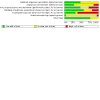
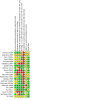
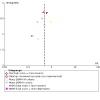
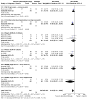


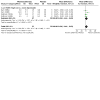



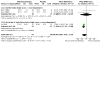
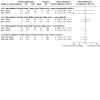
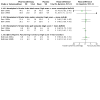

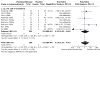

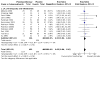
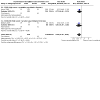
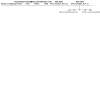


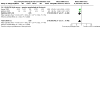
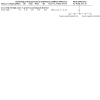

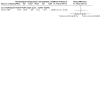
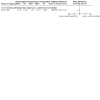

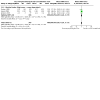
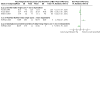
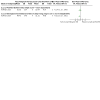
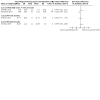
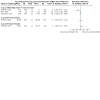





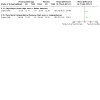
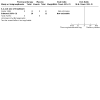
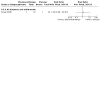
Update of
-
Interventions for preventing depression after stroke.Cochrane Database Syst Rev. 2008 Jul 16;(3):CD003689. doi: 10.1002/14651858.CD003689.pub3. Cochrane Database Syst Rev. 2008. Update in: Cochrane Database Syst Rev. 2020 May 11;5:CD003689. doi: 10.1002/14651858.CD003689.pub4. PMID: 18646094 Updated.
References
References to studies included in this review
Almeida 2006 {published data only}
-
- Almeida OP, Waterreus A, Hankey GJ. Preventing depression after stroke: results from a randomised placebo-controlled trial. Journal of Clinical Psychiatry 2006;67(7):1104-9. - PubMed
Creytens 1980 {published data only}
-
- Creytens G. New methods in treatment of cerebral pathology [Nouveautes dans le traitement de la pathologie cerebrale]. Acta Therapeutica 1980;6(1):33-53.
Dam 1996a {published data only}
-
- Dam M, Tonin P, De Boni A, Pizzolato G, Casson S, Ermani M, et al. Effects of fluoxetine and maprotiline on functional recovery in poststroke hemiplegic patients undergoing rehabilitation therapy. Psychiatria Hungarica 1998;Suppl 2:47-54. - PubMed
-
- Dam M, Tonin P, De Boni A, Pizzolato G, Casson S, Ermani M, et al. Effects of fluoxetine and maprotiline on functional recovery in poststroke hemiplegic patients undergoing rehabilitation therapy. Stroke 1996;27(7):1211-4. - PubMed
Dam 1996b {published data only}
-
- Dam M, Tonin P, De Boni A, Pizzolato G, Casson S, Ermani M, et al. Effects of fluoxetine and maprotiline on functional recovery in poststroke hemiplegic patients undergoing rehabilitation therapy. Psychiatria Hungarica 1998;Suppl 2:47-54. - PubMed
-
- Dam M, Tonin P, De Boni A, Pizzolato G, Casson S, Ermani M, et al. Effects of fluoxetine and maprotiline on functional recovery in poststroke hemiplegic patients undergoing rehabilitation therapy. Stroke 1996;27(7):1211-4. - PubMed
Forster 1996 {published data only}
-
- Dowswell G, Lawler J, Dowswell T, Young J, Forster A, Hearn J. Investigating recovery from stroke: a qualitative study. Journal of Clinical Nursing 2000;9:507-15. - PubMed
-
- Dowswell G, Lawler J, Hearn J, Young J, Forster A. Recovering after stroke: a qualitative study of patient and care-giver views and the impact of specialist nurse intervention. Research report to Northern and Yorkshire Regional Health Authority from the Department of Applied Social Studies, University of Bradford, Bradford, UK 1999.
-
- Dowswell G, Lawler J, Young J, Forster A, Hearn J. A qualitative study of specialist nurse support for stroke patients and care-givers at home. Clinical Rehabilitation 1997;11:293-301. - PubMed
-
- Dowswell G, Lawler L, Young J. Unpacking the 'black box' of a nurse-led stroke support service. Clinical Rehabilitation 2000;14:160-71. - PubMed
Goldberg 1997 {published data only}
-
- Goldberg G, Segal ME, Berk SN, Schall RR, Gershkoff AM. Stroke transition after inpatient rehabilitation. Topics in Stroke Rehabilitation 1997;4(1):64-79. - PubMed
Grade 1998 {published data only}
-
- Grade C, Redford B, Chrostowski J, Toussaint L, Blackwell B. Methylphenidate in early poststroke recovery: a double-blind, placebo-controlled study. Archives of Physical Medicine and Rehabilitation 1998;79(9):1047-50. - PubMed
Hoffman 2015 {published data only}
-
- ACTRN12609000741280. Evaluation of brief interventions for enhancing early emotional adjustment following stroke: A pilot randomised controlled trial. https://www.anzctr.org.au/Trial/Registration/TrialReview.aspx?id=308355&... (first received 25 August 2009).
-
- Hoffmann T, Ownsworth T, Eames S, Shum D. Evaluation of brief interventions for enhancing early emotional adjustment following stroke: a pilot randomised controlled trial. Topics in Stroke Rehabilitation 2015;22(2):117-26. - PubMed
-
- Ownsworth T, Hoffman T, Stemm B, Evans E, Howlett J, Shum D. Early cognitive appraisals, benefit finding and emotional status after stroke: pre-intervention associations and preliminary intervention findings. Brain Impairment 2011;12:66.
House 2000 {published data only}
-
- House A, Knapp P, Dempster C, Garbett F, Todd C, Bamford J, et al. Does psychological treatment improve the outcomes after stroke? In: Proceedings of the British Psychological Society. Vol. 6. 1998:33.
-
- House A. Problem-solving therapy improves psychological outcome after stroke: a randomised controlled trial. Unpublished 2003.
-
- House A. The treatment of depression after stroke. Journal of Psychosomatic Research 2000;48(3):235.
Kerr 2018 {published data only}
-
- Kerr D, Mackey E, Wijeratne T, McCann T. Nursing early motivational interviewing on post stroke depressive symptoms: pilot randomized controlled trial of the good mood intervention program. International Journal of Stroke 2014;19:245. - PubMed
-
- Kerr D, McCann T, Mackey E, Wijeratne T. Effects of early motivational interviewing on post-stroke depressive symptoms: a pilot randomised study of the Good Mood Intervention program. International Journal of Nursing Practice 2018;24:1-8. - PubMed
Palomaki 1999 {published data only}
-
- Berg A, Palomaki H, Lehtihalmes M, Lonnqvist J, Kaste M. Poststroke depression: an 18-month follow-up. Stroke 2003;34:138-43. - PubMed
-
- Palomaki H, Kaste M, Berg A, Lonnqvist R, Lehtihalmes M. Post-stroke sleep disorder treated with mianserin. Cerebrovascular Diseases 1997;7 Suppl 4:27.
-
- Palomaki H, Kaste M, Berg A, Lonnqvist R, Lonnqvist J, Lehtihalmes M, et al. Complaints of poststroke insomnia and its treatment with mianserin. Cerebrovascular Diseases 2003;15(1-2):56-62. - PubMed
-
- Palomaki H, Kaste M, Berg A, Lonnqvist R, Lonnqvist J, Lehtihalmes M, et al. Prevention of poststroke depression: 1 year randomised placebo controlled double blind trial of mianserin with 6 month follow up after therapy. Journal of Neurology, Neurosurgery and Psychiatry 1999;66(4):490-4. - PMC - PubMed
Rasmussen 2003 {published data only}
-
- Rasmussen A, Lunde M, Poulsen D, Sorensen K, Qvitzau S, Bech P. A double-blind, placebo-controlled study of sertraline in the prevention of depression in stroke patients. Psychosomatics 2003;44(3):216-21. - PubMed
-
- Rasmussen A, Lunde M, Sorensen K, Qvitzau S, Bech P. A double-blind placebo-controlled study of sertraline in the prevention of depression in stroke patients. European Neuropsychopharmacology 2002;12 Suppl 3:231. - PubMed
-
- Rasmussen A. A double blind controlled study of the influence of sertraline on the incidence of post stroke depression and on emotional lability. PhD Thesis 2001.
-
- Rasmussen A. Depression and stroke. Nordic Journal of Psychiatry 2001;55(4):288.
-
- Rasmussen A. Prophylatic treatment for post stroke depression and comorbidity. Journal of Psychosomatic Research 2000;48(3):66.
Reding 1986 {published and unpublished data}
-
- Reding MJ, Orto LA, Winter SW, Fortuna IM, Di Ponte P, McDowell FH. Antidepressant therapy after stroke: a double-blind trial. Archives of Neurology 1986;43(8):763-5. - PubMed
Robinson 2000a {published data only}
-
- Chan KL, Campayo A, Moser DJ, Arndt S, Robinson RG. Aggressive behavior in patients with stroke: association with psychopathology and results of antidepressant treatment. Archives of Physical Medicine and Rehabilitation 2006;87:793-8. - PubMed
-
- Chemerinski E, Robinson RG, Arndt S, Kosier JT. The effect of remission of poststroke depression on activities of daily living in a double-blind randomized treatment study. Journal of Nervous and Mental Disease 2001;189(7):421-5. - PubMed
-
- Dean CE, Sonis J. Mortality and poststroke depression. American Journal of Psychiatry 2004;161(8):1506-7. - PubMed
-
- Franco K, Malhotra S. Poststroke depression. American Journal of Psychiatry 2001;158(4):658-9. - PubMed
-
- Jorge R. The effect of antidepressants on mortality after stroke. In: Proceedings of the 158th Annual Meeting of the American Psychiatric Association. USA, Atlanta, Georgia, 21-26 May 2005:16D.
Robinson 2000b {published data only}
-
- Chan KL, Campayo A, Moser DJ, Arndt S, Robinson RG. Aggressive behavior in patients with stroke: association with psychopathology and results of antidepressant treatment. Archives of Physical Medicine and Rehabilitation 2006;87:793-8. - PubMed
-
- Chemerinski E, Robinson RG, Arndt S, Kosier JT. The effect of remission of poststroke depression on activities of daily living in a double-blind randomized treatment study. Journal of Nervous and Mental Disease 2001;189(7):421-5. - PubMed
-
- Dean CE, Sonis J. Mortality and poststroke depression. American Journal of Psychiatry 2004;161(8):1506-7. - PubMed
-
- Franco K, Malhotra S. Poststroke depression. American Journal of Psychiatry 2001;158(4):658-9. - PubMed
-
- Jorge R. The effect of antidepressants on mortality after stroke. In: Proceedings of the 158th Annual Meeting of the American Psychiatric Association. USA, Atlanta, Georgia, 21-26 May 2005:16D.
Robinson 2008 {published data only}
Roh 1996 {published data only}
-
- Roh JK, Lee KH, Kim M, Yamamoto M. Accelerated recovery from ischemic stroke with indeloxazine hydrochloride: results of a double-masked clinical study in Korea. Current Therapeutic Research, Clinical and Experimental 1996;57(8):632-42.
Tsai 2011 {published data only}
-
- Tsai CS, Wua CL, Chouf SY, Tsanga HY, Su JA. Prevention of poststroke depression with milnacipran in patients with acute ischemic stroke: a double-blind randomized placebo-controlled trial. International Clinical Psychopharmacology 2011;26(5):263-7. - PubMed
Watkins 2007 {published and unpublished data}
-
- Deans CF, Jack CIA. Evaluation of motivational interviewing early after acute stroke: a randomized controlled trial. Clinical Rehabilitation 2006;20:731-6.
-
- Sutton C, Dickinson H, Leathley M, Hills K, Auton M, Lightbody E, et al. Motivational interviewing: altering outcome after stroke. In: 12th European Stroke Conference. Valencia, Spain, 2003 May 21-24:103.
-
- Van den Broek MD. Motivational interviewing after stroke. In: Society for Research in Rehabilitation Winter Conference. Preston, United Kingdom, 2003.
-
- Watkins CL, Auton MF, Deans CF, Dickinson HA, Jack CI, Lightbody CE, et al. Motivational interviewing early after acute stroke: a randomized, controlled trial. Stroke 2007;38:1004-9. [ISRCTN544654472] - PubMed
Wichowicz 2017 {published data only}
-
- Wichowicz HM, Puchalska L, Rybak-Korneluk AM, Gąsecki D, Wiśniewska A. Application of Solution-Focused Brief Therapy (SFBT) in individuals after stroke. Brain Injury 2017;31(11):1507-12. - PubMed
Xu 2006 {published data only}
-
- Xu J, Wang JP, Liu J. Preventive effects of antidepressant on post-stroke depression. Chinese Mental Health Journal 2006;20(3):186-8.
References to studies excluded from this review
Aben 2014 {published data only}
-
- Aben L, Heijenbrok-Kal MH, Ponds RW, BusschbachJJV, Ribbers GM. Long-lasting effects of a new memory self-efficacy training for stroke patients: a randomized controlled trial. Neurorehabilitation and Neural Repair 2014;28(3):199-206. - PubMed
-
- Aben L, Heijenbrok-Kal MH, Loon EM, Groet E, Ponds RW, Busschbach JJV, et al. Training memory self-efficacy in the chronic stage after stroke: a randomized controlled trial. Neurorehabilitation and Neural Repair 2013;27(2):110-7. - PubMed
Agnoli 1985 {published data only}
-
- Agnoli A, Fioravanti M, Lechner H. Efficacy of CDP-choline in chronic cerebral vascular diseases (CCVD). In: Zappia V, Kennedy EP, Nilsson BI, Galletti P, editors(s). Novel Biochemical, Pharmacological and Clinical Aspects of Cytidinediphosphocholine. New York: Elsevier, 1985:305-15.
Bramanti 1989 {published data only}
-
- Bramanti P, Ricci RM, Di Bella P, De Luca GP, Sessa E, Di Leo M, et al. Neuropsychologic and clinical evaluation of the administration of protirelin tartrate in cerebrovascular diseases. Rassegna di Medicina Interna 1989;10(4):157-61.
Casella 1960 {published data only}
-
- Casella C, Sokolow J. A study to determine the energizing effects of iproniazid (Marsilid) on a group of hemiplegics. Archives of Physical Medicine and Rehabilitation 1960;41:381-5. - PubMed
Choi‐Kwon 2006 {published data only}
-
- Choi-Kwon S, Choi J, Kwon SU, Kang D, Kim JS. Fluoxetine is not effective in the treatment of poststroke fatigue: a double-blind, placebo controlled study. Cerebrovascular Diseases 2007;23:103-8. - PubMed
-
- Choi-Kwon S, Han SW, Kwon SU, Kang DW, Choi JM, Kim JS. Fluoxetine treatment in poststroke depression, emotional incontinence, and anger proneness: a double-blind, placebo-controlled study. Stroke 2006;37:156-61. - PubMed
-
- Kim JS. Post-stroke emotional disturbances. In: Symposium 3: Prevention of Recurrent Vascular Events and Other Complications of Stroke. 2006.
Downes 1995 {published data only}
-
- Downes B, Rooney V, Oyebode JR, Roper-Hall A, Mayer P, Main A. The effect of giving information and counselling on depression and anxiety in stroke survivors and carers (The Birmingham Stroke Counselling Project). Unpublished 1995.
F.X. 1976 {published data only}
-
- FX Project for Phase III Study. Double blind study of FX-505 (ifenprodil) on cerebrovascular diseases: phase III study. Rinsho Hyoka 1976;4(3):419-58.
Friedland 1992 {published data only}
-
- Friedland J, McColl M. Social support for stroke survivors: development and evaluation of an intervention program. Physical and Occupational Therapy in Geriatrics 1989;7(3):55-69.
-
- Friedland JF, McColl M. Social support intervention after stroke: results of a randomized trial. Archives of Physical Medicine and Rehabilitation 1992;73(6):573-81. - PubMed
Graffingo 2003 {published data only}
-
- Graffingo C. Poststroke depression and functional recovery (SADBRAIN). Unpublished 2003.
Hadidi 2014 {published data only}
-
- Hadidi N, Buckwalter K, Lindquist R, Rangen C. Feasibility of a pilot study of problem-solving therapy for stroke survivors. Rehabilitation Nursing 2014;40(5):327-37. - PubMed
Ijzerman 2005 {published data only}
-
- ISRCTN88489864. Influence of a single dose of fluoxetine on muscle activation patterns and functional ability in chronic stroke patients. http://www.isrctn.com/ISRCTN88489864?q=&filters=&sort=&offse... (first received 20 December 2005).
-
- Ijzerman MJ, Genderen HI, Nijlant JJ. Effect of a single dose of the SSRI fluoxetine on motor activation patterns of the upper extremity in chronic stroke survivors. Neurorehabilitation and Neural Repair 2006;20(1):158 (Abst P2-024).
Isenberg 2000 {published data only}
-
- Isenberg N. A double-blind, placebo controlled, dose-ranging study of nefiracetam in patients with post-stroke depression. Daiichi Pharmaceutical Co 2000.
Kim 2017 {published data only}
-
- Kim JS, Lee EJ, Chang D, Park JH, Ahn SH, Cha JK, et al, EMOTION investigators. Efficacy of early administration of escitalopram on depressive and emotional symptoms and neurological dysfunction after stroke: a multicentre,double-blind,randomised, placebo-controlled study. Lancet Psychiatry 2017;4(1):33-41. - PubMed
Kim 2017a {published data only}
Laska 2005 {published data only}
-
- Laska AC, Mårtensson B, Kahan T, Arbin M, Murray V. Recognition of depression in aphasic stroke patients. Cerebrovascular Diseases 2007;24(1):74-9. - PubMed
-
- Laska AC, Arbin M, Kahan T, Hellblom A, Murray V. Long-term antidepressant treatment with moclobemide for aphasia in acute stroke patients: a randomised, double-blind, placebo-controlled study. Cerebrovascular Diseases 2005;19(2):125-32. - PubMed
Latow 1983 {published data only}
-
- Latow J. Psychotherapy and its effect on depression, sick-role identification and rehabilitation outcome for stroke victims. Archives of Physical Medicine and Rehabilitation 1983;64(10):511-2.
Leathley 2003 {published data only}
-
- Leathley M, Fall S, Sharma A, Watkins C, Barer D. Life after stroke: multicentre trial of psychosocial interventions after stroke. Cerebrovascular Diseases 2003;16 Suppl 4:70.
Leijon 1989 {published data only}
-
- Leijon G, Boivie J. Central post-stroke pain: a controlled trial of amitriptyline and carbamazepine. Pain 1989;36(1):27-36. - PubMed
Lobjanidze 2010 {published data only}
-
- Lobjanidze N, Dzagnidze A, Jeiranashvili A, Kukava M, Beridze M, Khachiashvili M, et al. Long-term effects of the use of citicoline (ceraxone) in the post-stroke cognitive-mood impairment. Cerebrovascular Diseases 2010;29 Suppl 2:615.
Martucci 1986 {published data only}
-
- Martucci N, Manna V, Mailland F. Electroencephalographic-pharmacological and neuropsychological study of dihydroergocristine mesylate in patients with chronic cerebrovascular disease. Advances in Therapy 1986;3(4):210-23.
McCafferty 2000 {published data only}
-
- McCafferty G, Kilcullen P, Kligerman B, Hickling E, Taylor A, Davidson B. A psychosocial intervention for post-stroke depression (PDS): a controlled treatment study. Journal of Stroke and Cerebrovascular Diseases 2000;9(4):200.
Ohtomo 1985 {published data only}
-
- Ohtomo E, Kutsuzawa T, Araki G, Hirai S, Terashi A, Kuzuya F, et al. Clinical usefulness of tiapride on psychiatric symptoms caused by cerebrovascular disorders. Clinical Evaluation 1985;13:295-332.
Ostwald 2006 {published data only}
-
- NCT00178529. Intervention for stroke survivors and spousal caregivers. https://clinicaltrials.gov/ct2/show/NCT00178529 (first received 15 September 2005).
Ostwald 2014 {published data only}
-
- NCT00178529. Intervention for stroke survivors and spousal caregivers. https://clinicaltrials.gov/ct2/show/NCT00178529 (first received 15 September 2005).
-
- Ostwald S, Godwin K, Cron S, Kelley C, Hersch G, Davis S. Home-based psychoeducational and mailed information programs for stroke-caregiving dyads post-discharge: a randomized trial. Disability & Rehabilitation 2014;36(1):55-62. - PubMed
Otomo 1986 {published data only}
-
- Otomo E, Tohgi H, Hirai S, Gotoh F, Hasegawa K, Tazaki Y, et al. Clinical evaluation of YM-08054 (indeloxazine) in the treatment of cerebrovascular disorder. Igaku no Ayumi 1986;136(7):535-55.
Poppitt 2009 {published data only}
-
- Poppitt SD, Howe CA, Lithander FE, Silvers KM, LinRB, Croft J, et al. Effects of moderate-dose omega-3 fish oil on cardiovascular risk factors and mood after ischemic stroke: a randomized controlled trial. Stroke 2009;40:3485-92. - PubMed
Raffaele 1996 {published data only}
-
- Raffaele R, Rampello L, Vecchio I, Tornali C, Malaguanera M. Trazodone therapy of the post-stroke depression. Archives of Gerontology and Geriatrics 1996;22 Suppl 1:217-20. - PubMed
Sasaki 2017 {published data only}
-
- Sasaki N, Hara T, Yamada N, Niimi M, Kakuda W, Abo M. The efficacy of high-frequency repetitive transcranial magnetic stimulation for improving apathy in chronic stroke patients. European Neurology 2017;78:28-32. - PubMed
Sivenius 2001 {published data only}
-
- Sivenius J, Sarasoja T, Aaltonen H, Heinonen E, Kilkku O, Reinikainen K. Selegiline treatment facilitates recovery after stroke. Journal of Neurologic Rehabilitation 2001;15(3):183-90. - PubMed
Walker‐Batson 1995 {published data only}
-
- Walker-Batson D, Smith P, Curtis S, Unwin H, Greenlee R. Amphetamine paired with physical therapy accelerates motor recovery after stroke: further evidence. Stroke 1995;26(12):2254-9. - PubMed
Yamamoto 1999 {published data only}
-
- Yamamoto T, Nishimura R, Takagi T. Importance of a psychological approach to the chronic cerebral vascular accident patient. In: Proceedings of the 13th International Congress of the World Confederation of Physical Therapy. Yokohama, Japan, 1999.
References to studies awaiting assessment
Chang 2011 {published data only}
-
- Chang K, ZhangH, Xia Y, Chen C. Testing the effectiveness of knowledge and behavior therapy in patients of hemiplegic stroke. Topics in Stroke Rehabilitation 2011;18(5):525–35. - PubMed
Evans 1985 {published data only}
-
- Evans RL, Kleinman L, Halar EM, Herzer K. Predicting outcome of group counselling with severely disabled patients. American Journal of Physical Medicine 1985;64(1):24-31. - PubMed
IRCT201112228490N1 {published data only}
-
- IRCT201112228490N1. Effect of fluoxetine on functional recovery of patients with cerebrovascular accident following middle cerebral artery trunk obstruction: a randomized clinical trial. http://en.irct.ir/trial/8954 (first received 25 January 2012).
Katz 1998 {published data only}
-
- Katz RA, Hubbard DJ, Blaine J. The effect of group psychotherapy on post-stroke depression. Rehabilitation Psychology 1998;43(2):178.
Razazian 2016 {published data only}
-
- Razazian N, Esmaeili O, Almasi A. Effect of fluoxetine on motor improvement in ischemic stroke patients: a double blind clinical trial study. Journal of Research in Medical Science 2016;In press:1-6.
References to ongoing studies
Kirkevold 2018 {published data only}
Sitzer 2002 {published data only}
-
- Huff W. Prevention of depression after ischemic stroke: PreDIS. Stroke Trials Directory, www.strokecenter.org/trials/TrialDetail (first received 25 September 2001).
-
- Huff W, Steckel R, Sitzer M. Prevention of depression after ischemic stroke - the PreDIS study. Pharmacopsychiatry 2001;34(5):Abst. 85.
-
- Sitzer M, Steckel R. Prevention of poststroke depression after acute ischaemic stroke using the selective serotonin reuptake-inhibitor sertraline (PREDIS-Study). Stroke 2002;33(2):651-2.
-
- Sitzer M, Steckel R. Prevention of poststroke depression after acute ischemic stroke using the selective serotonin reuptake-inhibitor sertraline (PreDIS-study). In: Proceedings of the 27th International Stroke Conference. USA, San Antonio: The American Stroke Association, 7-9 February 2002:(Abst. CTP326).
Additional references
Adams 1990
-
- Adams RJ, Meador KJ, Sethi KD, Grotta JC, Thomson DS. Graded neurologic scale for use in acute hemispheric stroke treatment protocols. Stroke 1990;71:876-80. - PubMed
Allida 2020
Anderson 1995
-
- Anderson CS, Linto J, Stewart-Wynne EG. A population-based assessment of the impact and burden of caregiving for long-term stroke survivors. Stroke 1995;26:843-9. - PubMed
APA 1987
-
- American Psychiatric Association. Diagnostic and statistical manual of mental disorders: DSM-III-R. Washington, DC: American Psychiatric Association, 1987.
APA 1994
-
- American Psychiatric Association. Diagnostic and statistical manual of mental disorders: DSM-IV. Washington, DC: American Psychiatric Association, 1994.
APA 2013
-
- American Psychiatric Association, DSM-5 Task Force. Diagnostic and statistical manual of mental disorders: DSM-5™ (5th ed.). Arlington, VA, USA: American Psychiatric Publishing, Inc., 2013.
Atkins 2004
Ayerbe 2013
-
- Ayerbe L, Ayis S, Wolfe CDA, Rudd AG. Natural history, predictors and outcomes of depression after stroke: systematic review and meta-analysis. British Journal of Psychiatry 2013;202:14-21. - PubMed
Baker 2018
-
- Baker C, Worrall L, Rose M, Hudson K, Ryan B, O'Byrne L. A systematic review of rehabilitation interventions to prevent and treat depression in post-stroke aphasia. Disability and Rehabilitation 2018;40(16):1870-92. - PubMed
Beck 1961
-
- Beck AT, Ward C, Mendelson M. An inventory for measuring depression. Archives of General Psychiatry 1961;4:561-71. - PubMed
Clark 1999
-
- Clark HD, Wells GA, Huët C, McAlister FA, Salmi LR, Fergusson D, et al. Assessing the quality of randomized trials: reliability of the Jadad scale. Control Clinical Trials 1999;20(5):448-52. - PubMed
Deeks 2011
-
- Deeks JJ, Higgins JP, Altman DG, editor(s). Chapter 9: Analysing data and undertaking meta-analyses. In: Higgins JP, GreenS, editor(s). Cochrane Handbook for Systematic Reviews of Interventions Version 5.1.0 (updated March 2011). The Cochrane Collaboration, 2011. Available from handbook.cochrane.org.
Ebrahim 1987
-
- Ebrahim S, Barer D, Nouri F. Affective illness after stroke. British Journal of Psychiatry 1987;151:52-6. - PubMed
FOCUS 2019
Folstein 1975
-
- Folstein MF, Folstein SE, McHugh PR. 'Mini-Mental State': a practical method for grading the cognitive state of patients for the clinician. Journal of Psychiatric Research 1975;12:189-98. - PubMed
Goldberg 1972
-
- Goldberg DP. The Detection of Psychiatric Illness by Questionnaire. Vol. Maudsley Monograph No. 21. Oxford: Oxford University Press, 1972.
Gompertz 1993
-
- Gompertz P, Pound P, Ebrahim S. The reliability of stroke outcome measurement. Clinical Rehabilitation 1993;7:290-6.
GRADEproGDT 2015 [Computer program]
-
- GRADEproGDT. Hamilton (ON): McMaster University (developed by Evidence Prime). Hamilton (ON): McMaster University (developed by Evidence Prime). Available at gradepro.org, 2015.
Hackett 2005a
-
- Hackett ML, Yapa C, Parag V, Anderson CS. Frequency of depression after stroke: a systematic review of observational studies. Stroke 2005;36:1330-40. - PubMed
Hackett 2014
-
- Hackett M, Pickles K. Part I: frequency of depression after stroke: an updated systematic review and meta-analysis of observational studies. World Stroke Organisation 2014;9(December):1017-25. - PubMed
Hamilton 1960
Higgins 2019
-
- Higgins JP, Thomas J, Chandler J, Cumpston M, Li T, Page MJ, et al (editors). Cochrane Handbook for Systematic Reviews of Interventions Version 6.0 (updated July 2019). Cochrane, 2019. Available from www.training.cochrane.org/handbook. - PMC - PubMed
House 1989
-
- House A, Dennis M, Hawton K, Warlow C. Methods of identifying mood disorders in stroke patients: experience in the Oxfordshire community Stroke Project. Age and Aging 1989;18:371-9. - PubMed
House 2001
-
- House A, Knapp P, Bamford J, Vail A. Mortality at 12 and 24 months after stroke may be associated with depressive symptoms at 1 month. Stroke 2001;32:696-701. - PubMed
Hunt 1986
-
- Hunt SM, McEwan J, McKenna SP. Measuring Health Status. Beckenham: Croom Helm, 1986.
ICD 10 1992
-
- World Health Organization. The ICD-10 classification of mental and behavioural disorders: clinical descriptions and diagnostic guidelines. Geneva: World Health Organization, 1992.
Katona 1995
-
- Katona CL, Watkin V. Depression in old age. Reviews in Clinical Gerontology 1995;5:427-41.
Lewis 2019
Mahoney 1965
-
- Mahoney FI, Barthel DW. Functional evaluation: the Barthel Index. Maryland State Medical Journal 1965;14:61-5. - PubMed
Montgomery 1979
-
- Montgomery SA, Asberg M. A new depression scale designed to be sensitive to change. British Journal of Psychiatry 1979;134:382-9. - PubMed
Morris 1993
-
- Morris PL, Robinson RG, Andrzejewski P, Samuels J, Price TR. Association of depression with 10-year poststroke mortality. American Journal of Psychiatry 1993;150:124-9. - PubMed
Normand 1999
-
- Normand ST. Meta-analysis: formulating, evaluating,combining, and reporting. Statistics in Medicine 1999;18:321-59. - PubMed
Parikh 1990
-
- Parikh RM, Robinson RG, Lipsey JR, Starkstein SE, Fedoroff JP, Price TR. The impact of poststroke depression on recovery in activities of daily living over a 2-year follow-up. Archives of Neurology 1990;47:785-9. - PubMed
Rachid 2018
-
- Rachid F. Maintenance repetitive transcranial magnetic stimulation (rTMS) for relapse prevention in with depression: a review. Psychiatry Research 2018;262:363-72. - PubMed
Rankin 1957
-
- Rankin J. Cerebral vascular accidents in people over the age of 60. II. Prognosis. Scottish Medical Journal 1957;2:200-215. - PubMed
Review Manager 2014 [Computer program]
-
- Nordic Cochrane Centre, The Cochrane Collaboration. Review Manager 5 (RevMan 5). Version 5.3. Copenhagen: Nordic Cochrane Centre, The Cochrane Collaboration, 2014.
Robinson 1986
-
- Robinson RG, Bolla-Wilson K, Kaplan E, Lipsey JR, Price TR. Depression influences intellectual impairment in stroke patients. British Journal of Psychiatry 1986;148:541-7. - PubMed
Salter 2013
-
- Salter KL, Foley NC, Zhu L, Jutai JW, Teasell RW. Prevention of poststroke depression: Ddes prophylactic pharmacotherapy work? Journal of Stroke and Cerebrovascular Diseases 2013;22(8):1243-51. - PubMed
Schünemann 2019
-
- Schünemann HJ, Higgins JP, Vist GE, Glasziou P, Akl EA, Skoetz N, et al. Chapter 14: Completing ‘Summary of findings’ tables and grading the certainty of the evidence. In: Higgins JP, Thomas J, Chandler J, Cumpston M, Li T, Page MJ, et al (editors). Cochrane Handbook for Systematic Reviews of Interventions Version 6.0 (updated July 2019). Available from www.training.cochrane.org/handbook.
Sinyor 1986
-
- Sinyor D, Amato P, Kaloupek DG, Becker R, Goldenberg M, Coopersmith H. Post-stroke depression: relationships to functional impairment, coping strategies, and rehabilitation outcome. Stroke 1986;17:1102-7. - PubMed
Stenager 1998
Turner‐Stokes 2003
-
- Turner-Stokes L. Poststroke depression: getting the full picture. Lancet 2003;361:1757-8. - PubMed
Verhagen 2001
-
- Verhagen AP, Vet HC, Bie RA, Boers M, den Brandt PA. The art of quality assessment of RCTs included in systematic reviews. Journal of Clinical Epidemiology 2001;54:651–4. - PubMed
Wade 1985
-
- Wade DT, Legh-Smith J, Langton Hewer R. Social activities after stroke: measurement and natural history using the Frenchay Activities Index. International Rehabilitation Medicine 1985;7(4):176-81. - PubMed
Ware 1993
-
- Ware JE, Snow KK, Kosinski M, Gandek B. SF-36 HealthSurvey: manual and interpretation guide. Boston, Mass:New England Medical Center, Health Institute 1993.
WHO 2000
-
- World Health Organization. The World Health Report 2000: Health systems: improving performance. Geneva: World Health Organization, 2000.
Yi 2010
-
- Yi ZM, Liu F Zhai SD. Fluoxetine for the prophylaxis of poststroke depression in patients with stroke: a meta-analysis. International Journal of Clinical Practice 2010;64(9):1310–7. - PubMed
Zigmond 1983
-
- Zigmond AS, Snaith RP. The Hospital Anxiety and Depression Scale. Acta Psychiatrica Scandinavica 1983;67:361-70. - PubMed
Zimmerman 2002
-
- Zimmerman M, Mattia JI, Posternak MA. Are subjects in pharmacological treatment trials of depression representative of patients in routine clinical practice? American Journal of Psychiatry 2002;159:469-73. - PubMed
References to other published versions of this review
Anderson 2001
Anderson 2004
Hackett 2005
-
- Hackett ML, Anderson CS, House AO. Management of depression after stroke: a systematic review of pharmacological therapies. Stroke 2005;36:1092-7. - PubMed
Publication types
MeSH terms
Substances
Grants and funding
LinkOut - more resources
Full Text Sources
Medical

